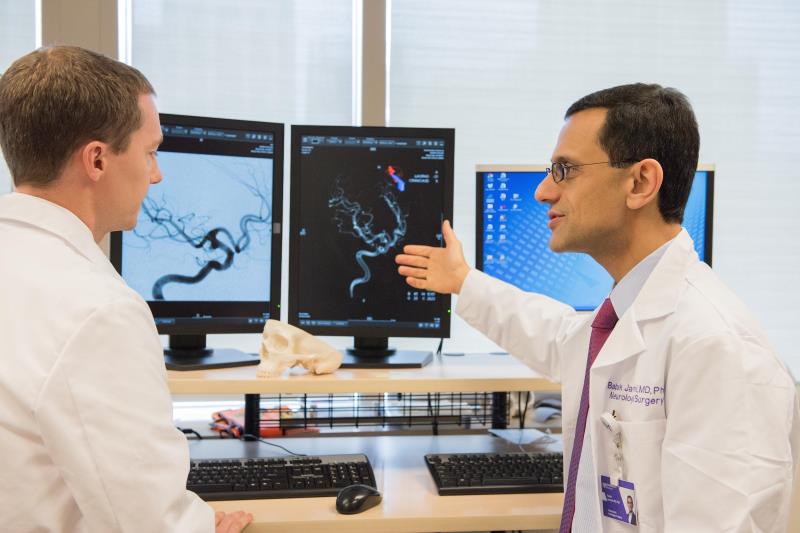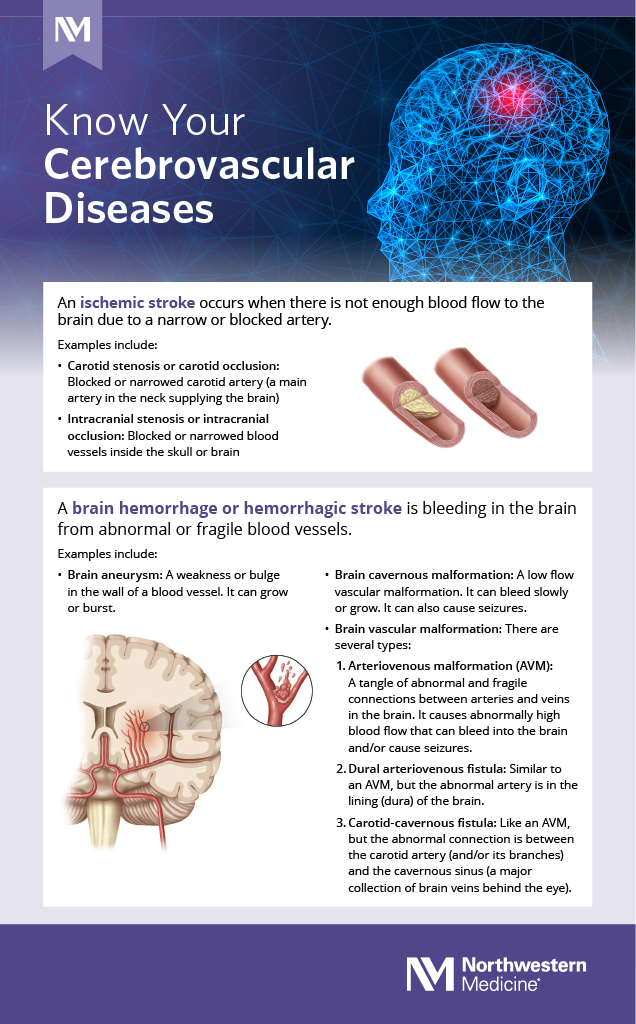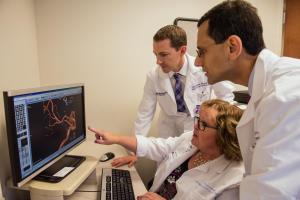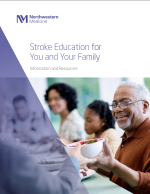
Back to Comprehensive Stroke Centers
Understanding Stroke and Cerebrovascular Disease
Cerebrovascular disease refers to a group of conditions that affect the blood vessels and blood supply to the brain. If a blockage, malformation, or hemorrhage prevents the brain cells from getting enough oxygen, brain damage can result.
Though not all cerebrovascular conditions explicitly pertain to stroke, they will often lead to a stroke and may exhibit similar symptoms.
Click here for location and appointment information.
What is Stroke?
A stroke is the sudden interruption of blood flow and oxygen to the brain. Otherwise known as “brain attacks,” strokes are the fifth leading cause of death in the United States.
Strokes occur when an artery carrying oxygen-rich blood to the brain either ruptures or becomes blocked by a blood clot. The lack of blood and oxygen results in brain cells beginning to die, which leads to brain damage.
- A transient ischemic attack (TIA) may also be thought of as a “minor stroke” or “mini stroke,” and may even be referred to by physicians as a “warning.” A TIA occurs when a blood clot blocks an artery for a short period of time. The symptoms of a TIA are like a stroke but are temporary, usually lasting only a few minutes.
- An ischemic stroke is a much more serious version of a TIA, occurring when blood flow to the brain has become narrowed or blocked by a blood clot. Ischemic strokes are by far the most common type, occurring in approximately 87% of cases. Unlike a TIA, the blood clot causing an ischemic stroke won’t go away on its own without treatment.
- A hemorrhagic stroke results when a blood vessel in your brain ruptures or breaks, spilling blood into the surrounding tissues. Less common and often more serious than ischemic strokes, hemorrhagic strokes are often due to complications from uncontrolled high blood pressure. A hemorrhagic stroke may be caused by an aneurysm or arteriovenous malformations.
Each of these types of stroke has a different cause and may require very different types of treatment, from medication to surgery. By evaluating the type of stroke you’re having and the area of the brain being affected, your emergency care team will determine the appropriate treatment.
Types of Cerebrovascular Diseases

Types of Cerebrovascular Diseases
Each of these conditions has a different cause and may require very different types of treatment, from medication to surgery. By evaluating your condition, your care team will determine the appropriate treatment.
- Angiomas
- Carotid Artery Disease
- Carotid Dissection
- Carotid Stenosis
- Cavernous Malformations
- Cerebral Aneurysms
- Cerebral or Spinal Arteriovenous Malformations and Dural Arteriovenous Fistulas
- Embolic Stroke
- Glossopharyngeal Neuralgia
- Head and Neck AVMs and Lymphatic or Venous Malformations
- Hemifacial Spasm
- Hemorrhagic Stroke
- Idiopathic Intracranial Hypertension and Venous Stenosis
- Intracerebral Hemorrhage
- Intracranial Stenosis
- Ischemic Stroke
- Moyamoya Disease
- Neurovascular Compression Syndromes
- Patent Foramen Ovale (PFO)
- Stroke
- Subarachnoid Hemorrhage
- Thrombotic Stroke
- Transient Ischemic Attack (TIA)
- Trigeminal Neuralgia
- Vertebral Artery Disease
Advanced Care and Technology
Northwestern Medicine is home to highly trained physicians, nurses and rehabilitation therapists who specialize in stroke care. We create individualized treatment plans that focus on your needs.
Our advanced care includes:
- Advanced Stroke Certification. Northwestern Medicine offers eight hospitals accredited by The Joint Commission as providing advanced levels of stroke care, including two Comprehensive Stroke Centers.
- Telestroke. We offer expansive telestroke network to provide vascular neurology consultations within seven minutes.
- Mobile Stroke Unit. The Mobile Stroke Unit is a specialized ambulance equipped with tools and staff normally only found inside a hospital. This unit is the first of its kind in Illinois, and one of the first in the world.
Meet the Teams



